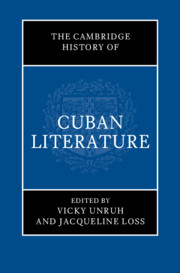Book contents
- The Cambridge History of Cuban Literature
- The Cambridge History of Cuban Literature
- Copyright page
- Dedication
- Contents
- Figures
- Contributors
- Acknowledgments
- Introduction Unfinished Histories
- Part I Literature in the Early Colony
- Part II Cuban Literature’s Long Nineteenth Century
- Part III Literary and Intellectual Culture in the Twentieth-Century Republic
- Part IV The Revolution’s Literary-Cultural Initiatives and Their Early Discontents
- Part V Cuba and Its Diasporas into the New Millennium
- 31 Alternative Cultural Projects and Their Histories
- 32 Ediciones Vigía and the Cultural Legacies of Matanzas
- 33 The Fiction of Cuba’s Special Period
- 34 Critique and Decentralization in Cuban Film After 1989
- 35 The Temporality of Twentieth- and Twenty-First-Century Cuban Theater
- 36 The Long Reach of Haiti in Cuban Literature
- 37 Cuban Afterlives of the Cuban and Angolan Revolutions
- 38 Anti-Exceptionalism in Detective Fiction, Speculative Fiction, and Graphic Novels
- 39 Cuban Women’s Writing at the Turn of the Millennium
- 40 Queering the Revolution and Its Diasporas
- 41 The Performance Art of Global Cuba
- 42 Twenty-First-Century Cuban Film and Diaspora
- 43 Cuba’s Poetic Imaginary (1989–2020)
- 44 Prose Narratives from Cuban America
- 45 Cuban Theater of the Diaspora in the United States
- Epilogue
- Select Bibliography
- Index
- References
44 - Prose Narratives from Cuban America
from Part V - Cuba and Its Diasporas into the New Millennium
Published online by Cambridge University Press: 31 August 2024
- The Cambridge History of Cuban Literature
- The Cambridge History of Cuban Literature
- Copyright page
- Dedication
- Contents
- Figures
- Contributors
- Acknowledgments
- Introduction Unfinished Histories
- Part I Literature in the Early Colony
- Part II Cuban Literature’s Long Nineteenth Century
- Part III Literary and Intellectual Culture in the Twentieth-Century Republic
- Part IV The Revolution’s Literary-Cultural Initiatives and Their Early Discontents
- Part V Cuba and Its Diasporas into the New Millennium
- 31 Alternative Cultural Projects and Their Histories
- 32 Ediciones Vigía and the Cultural Legacies of Matanzas
- 33 The Fiction of Cuba’s Special Period
- 34 Critique and Decentralization in Cuban Film After 1989
- 35 The Temporality of Twentieth- and Twenty-First-Century Cuban Theater
- 36 The Long Reach of Haiti in Cuban Literature
- 37 Cuban Afterlives of the Cuban and Angolan Revolutions
- 38 Anti-Exceptionalism in Detective Fiction, Speculative Fiction, and Graphic Novels
- 39 Cuban Women’s Writing at the Turn of the Millennium
- 40 Queering the Revolution and Its Diasporas
- 41 The Performance Art of Global Cuba
- 42 Twenty-First-Century Cuban Film and Diaspora
- 43 Cuba’s Poetic Imaginary (1989–2020)
- 44 Prose Narratives from Cuban America
- 45 Cuban Theater of the Diaspora in the United States
- Epilogue
- Select Bibliography
- Index
- References
Summary
This chapter unpacks the category “Cuban America” in order to examine Cuban fiction and nonfiction prose in the US by a rich ensemble of writers whose work elucidates how deterritorialization makes deciphering questions of belonging through literary categories challenging. Whereas Gustavo Pérez Firmat’s literature and criticism popularized the notion of hyphenated identities beginning in the 1990s, this chapter conveys a plethora of issues around Cuban Americanness for a rich and diverse ensemble of writers who, having arrived in the US in different eras, may write in English, Spanish, or a mix of the two, and whose relationship to their country of origin – Cuba or the US – is complicated. The chapter organizes these writers into four groupings: writers linked to the first postrevolutionary wave of exiles, who, it is argued, keep acculturation at arm’s length; writers whose exile was propelled by or contemporaneous with the 1980 Mariel exodus; second-generation Cuban US writers producing work primarily in English and pointing toward a Cuban US Latinidad; and Cuban writers who migrated to the US in the post-Soviet era.
Keywords
- Type
- Chapter
- Information
- The Cambridge History of Cuban Literature , pp. 692 - 706Publisher: Cambridge University PressPrint publication year: 2024

